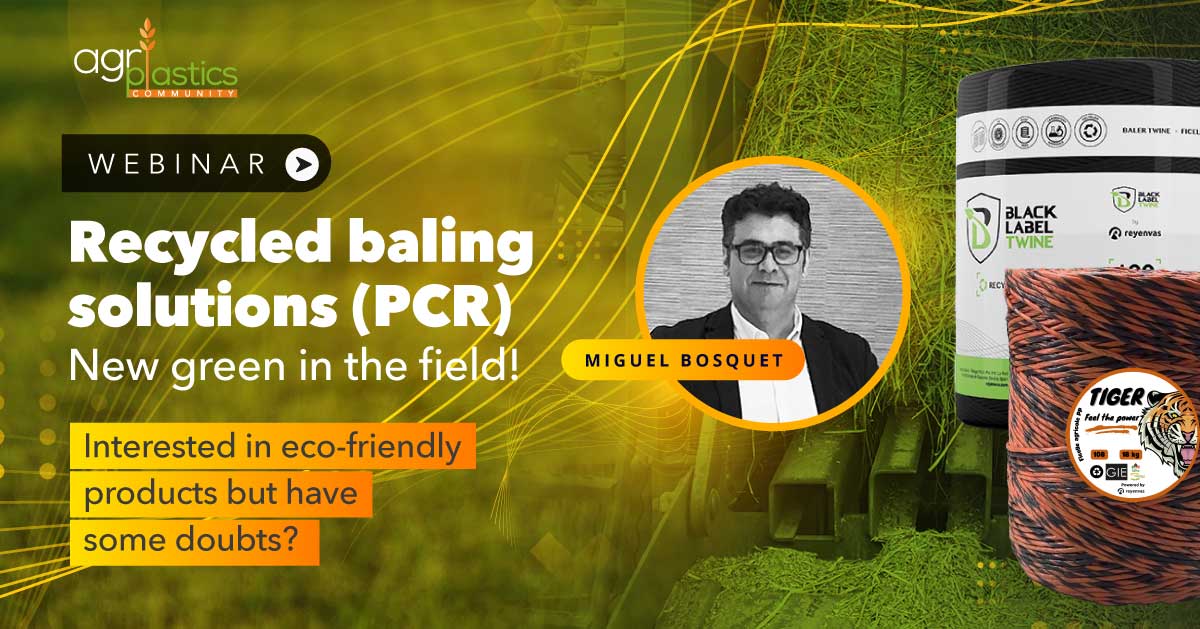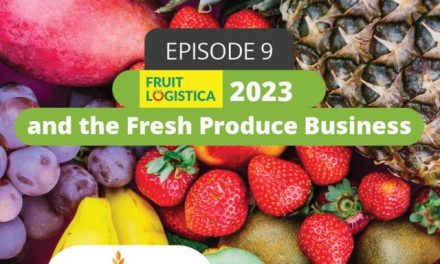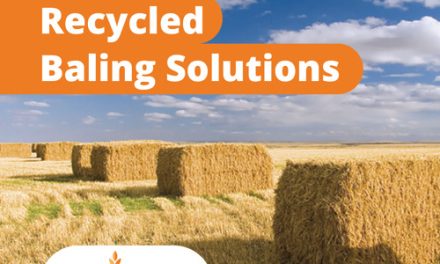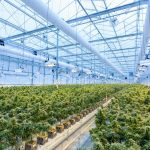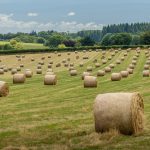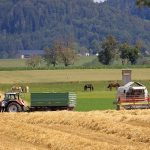
Trends in the fresh produce market

Every year, fairs, exhibitions, and seminars are held all over the world to inform agricultural experts and enthusiasts about all the innovations and technological advances applied to agriculture. This time we will talk about Fruit Logistica and the fresh produce market.
Fruit Logistica is a trade show held annually in Berlin, Germany, to cover all sectors of the fresh produce market. It is a window for visitors from around the world to have a more complete vision of the most recent innovations in products and services that are being developed, as well as the processes that are being implemented in terms of international supply chains.
Trevor Wells, responsible for the North American agricultural plastics market for the company Armando Alvarez Group, was able to interview Mike Knowles, CEO of Fruitnet Europe, partner of Fruit Logistica, and author of the new Trends Report published during the event entitled “What next for fresh produce? – Ten key trends for the fruit and vegetable business in 2023.”.
Below, we transcribe some of the questions that Trevor Wells asked Mike Knowles in one of our Agriplastics Community podcast episodes:
What is the next step for fresh produce?
According to Knowles, one of the biggest challenges he had in preparing his report was how to bring together all aspects of the fruit and vegetable business, to determine what trends are occurring in this large industry, and also what are the factors that affect all industries such as climate change, the economy, what is happening in Ukraine, and its impact on the markets.
Knowles explains that to put this report together “We wanted to talk to people working in different parts of the business such as retailers, producers, and those who provide the technology, all the key pieces of the supply chain. The idea was to create something readable where the different areas were covered, so we chose 10 people from different areas of the industry and talked to them about what’s going on.”
Knowles interviewed the Global Sourcing Director of Aldi, a German multinational, for his report, with whom he discussed efforts to improve and make the banana supply chain fairer, including better wages, and a better profit margin for producers, thus ensuring sustainable jobs and supplies over time.
He also contacted a company formed by German brothers, who develop satellite imagery and machine learning systems to help cashew nut farmers in Tanzania increase their income, and learned that their predictions of cashew yield, harvest, and the climatic factors involved make it easier to manage the crop and improve its performance.
“These two examples allow us to have a contrast of the different types of people we talked to. We talked to the head of the world’s largest fresh fruit company, Dole, and someone who is developing berry harvesting robots, addressing labor shortages, quality control systems that reduce food waste, and so on. Those are some of our 10 interviewees, and we think we have chosen wisely,” Knowles said.
How are technology, automation, and artificial intelligence influencing the fresh produce market?
According to Mike Knowles, it is essential to understand what is being done, and this is achieved through examples. When talking about artificial intelligence a good example would be a robotic system, a computer with wheels and seats in the field.
“When people are harvesting cauliflowers or cabbages, this ‘box’ on wheels follows them and knows where they are. What they do is put what they harvested in this vehicle, so they don’t have to drive it or move it, thus being automatically more efficient in terms of how they are harvesting.”
In this sense, he explains that artificial intelligence currently allows for predicting the shelf life of products, knowing from past experiences how a product will be sold in a particular environment. AI can warn people about food safety risks, as well as other aspects, hence the importance of investing in this technology which, far from being a threat, is an excellent tool in the fresh produce market, not only to make it more effective but also to avoid food waste.
“Scientists from a company called Vivent, in Switzerland, can detect stress levels in plants and use it as an early warning system to know what to do. For greenhouse managers, this type of AI can give them weeks of warning in advance. AI is just one area of technological advancement that has taken the fruit and vegetable business to places it has never been before.”
Is it possible to produce fruits and vegetables in a sustainable way?
Knowles points out that sustainability is a word that has been around for quite some time, as well as traceability and food safety. Maximum residue levels and the use of pesticides have also been topics of conversation for a long time.
In this context, food safety has been the most important element from the 2000s onwards, while sustainability is something everyone is talking about now. “I don’t think there have been sudden changes, maybe in the last 2 or 3 years there has been an acceleration in terms of corporate attitude towards sustainability, but you have to be careful what you mean by sustainability.”
He explains that what has been happening is that the corporate interest in sustainability manifested itself in the people and this is noticeable, especially in the retail environment, where there are now Sustainability Departments that perform a follow-up on them and their suppliers, as well as transforming processes such as, for example, the use of water and the reduction of non-recyclable materials.
“A lot of work is now being done to become more environmentally friendly, such as switching ships to cleaner fuels and reducing water use. In northern Italy they are producing tomatoes using energy from geothermal energy, just to name a few examples.”
We recommend you read our articles:
- Frequently asked questions about biodegradable mulching
- Baling twine PCR made from recycled materials
Knowles emphasizes that sustainability was something that had to reach all areas, including business practices, as it is not logical to devote time and effort to something that won’t be sustainable in the long term.
“It’s good to hear that some of these practices are now really taking root in the culture of large companies and becoming strategic practices of true sustainability.”
We recommend you read the article on sustainable agricultural films.
What are the main concerns in the fruit and vegetable market?
Mike Knowles believes that one of the main concerns may be consumer demand, as aspects such as cost of living and inflation are directly affecting markets, while consumers are becoming more price-conscious and buying less. “There will be a lot of ups and downs within the food business and fresh produce.”
However, he explains that despite a somewhat uncertain scenario with recessions and economic crises, there is a good opportunity to progress, to do things better to sell more fresh produce such as better-quality vegetables, thus increasing consumer demand.
What are the challenges and opportunities of increasingly globalized agriculture?
Knowles emphasizes the importance of taking advantage of opportunities to innovate and perhaps use products that wouldn’t have been sold fresh to create others, thus avoiding waste.
“An example of this is a product called ‘Brocamole,’ which is basically guacamole but made with a high volume of broccoli. It’s a sustainable action in terms of potential food waste. There’s a restaurant chain in London that scored a lot of PR points by saying they would no longer make guacamole with avocados, and instead, they would make it with pistachios or broccoli.”
He also explains that it is essential to consider the vision of retail producers, since they know their customers very well, they know what they buy every week, they know which way the wind is blowing, and they know what is changing in the fresh produce market.
Finally, Knowles reflects on how important it is for agricultural producers around the world to understand that process automation is a way to stay competitive in the fresh produce market.
“Such automation can be done in many different areas, it could simply be something looking at your orchards and telling you how productive you are, as well as how much fruit you can expect to harvest later on. This makes the actual physical labor and manual labor a lot easier, so I think automation is becoming more and more relevant in the fruit and vegetable business, creating new advantages for companies.”
For more information on this interview, we recommend you listen to our podcast episode here.

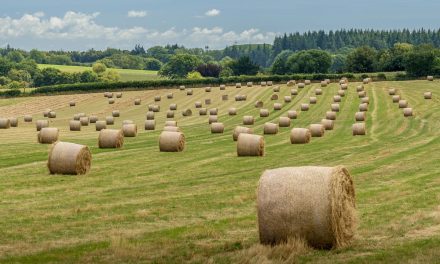
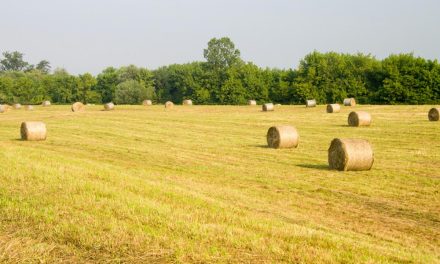
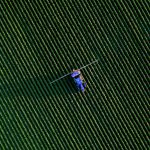
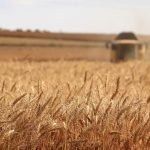
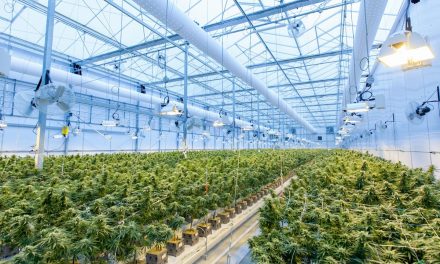
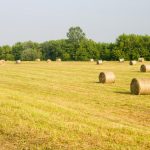

![[eBook] Sustainability and water management](https://agriplasticscommunity.com/wp-content/uploads/8_550x310_ENG-440x264.png)
![[eBook Trends in Agriculture Plastics] Increasing use of biodegradable mulch](https://agriplasticscommunity.com/wp-content/uploads/550 × 310_2_ENG-150x150.png)
![[eBook Trends in Agriculture Plastics] Reducing the plastic used in the manufacture of agricultural films](https://agriplasticscommunity.com/wp-content/uploads/550 × 310_1_ENG-150x150.png)



